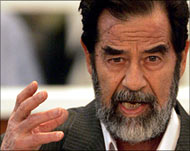Italy ‘warned’ US over Niger claim
Italian secret services had warned the United States in January 2003 that a dossier about a purported Iraq-Niger uranium deal was fake, an Italian lawmaker says.

“At about the same time as the State of the Union address … they [Italy’s SISMI secret services] said that the dossier didn’t correspond to the truth,” Senator Massimo Brutti told journalists on Thursday after a parliamentary commission was briefed by an Italian intelligence chief.
Brutti was referring to US President George Bush’s speech in the weeks before the start of the Iraq war.
The United States and Britain used the claim that Saddam Hussein was seeking uranium in Africa to bolster their case for the war. The intelligence supporting the claim was later deemed unreliable.
Brutti said he did not know the exact date that Italy informed Washington.
Senator Luigi Malabarba, another commission member from the opposition, who confirmed Brutti’s version of the briefing, also said he did not know the date the Italians warned the
Americans.
Parliamentary hearing
SISMI chief Nicolo Pollari had requested the hearing after Rome daily La Repubblica alleged last week that Italy had given the United States and Britain documents it knew were forged detailing a purported Iraqi deal to buy 500 tons of uranium concentrate from Niger. The uranium, known as yellowcake, can be used to make nuclear weapons.
 |
|
The US falsely claimed Saddam |
Also appearing before the parliamentary commission overseeing secret services was Premier Silvio Berlusconi’s top aide, cabinet undersecretary Gianni Letta.
The closed-door session lasted about four hours and commission members spoke with reporters after it was over.
La Repubblica, a strong Berlusconi opponent, has alleged that after the September 11 attacks in 2001, Pollari was under pressure from Berlusconi – a firm US ally – to make a strong contribution to the hunt for weapons of mass destruction in Iraq.
Berlusconi’s government has denied any wrongdoing and the premier has personally defended Pollari in the face of calls for his resignation.
Media probe
Italy’s alleged role in the case first became known when an Italian journalist from Panorama newsweekly revealed she had received a copy of the Niger dossier in October 2002 from a man she knew as a security consultant.
Elisabetta Burba has said she turned over a copy of the documents to the US Embassy in Rome in hopes of receiving an assessment of their authenticity.
She never heard back from US officials and, following an unfruitful trip to Niger, the magazine never published the documents, deeming them unreliable.
Brutti did not say how the Italian secret service obtained the dossier.
|
Brutti, a leading opposition senator, said SISMI analysed the documents between October 2002 and January 2003, when the Americans were informed.
“Of course, once this information was submitted and shown [to the Italians], it was said ‘No, this looks false to me,” Brutti replied when a journalist asked if the United States was informed of the Italian assessment.
Forged documents
Brutti said the commission was told that the documents were forged by an information peddler named Rocco Martino, whom he described as a former SISMI collaborator. Both Brutti and commission chairman Enzo Bianco quoted Pollari and Letta as saying that no SISMI officials were involved in forging the dossier or in distributing it.
In an interview with conservative daily Libero published on Thursday, Berlusconi said Italy had not passed any documents on the Niger affair to the United States. He added that La Repubblica’s allegations were dangerous for Italy because “if they were believed, we would be considered the instigator” of the war in Iraq.
The Niger claim is also at the centre of a CIA leak scandal that has shaken the administration of President Bush, leading to the indictment last week of Vice-President Dick Cheney’s former chief of staff, Lewis Libby.
Libby was charged with lying to investigators about leaking the identity of covert CIA operative Valerie Plame, wife of Bush administration critic Joseph Wilson. Wilson accused the Bush administration of covering up his inquiry into whether Iraq was trying to obtain uranium from Niger after he found the claim had no substance.